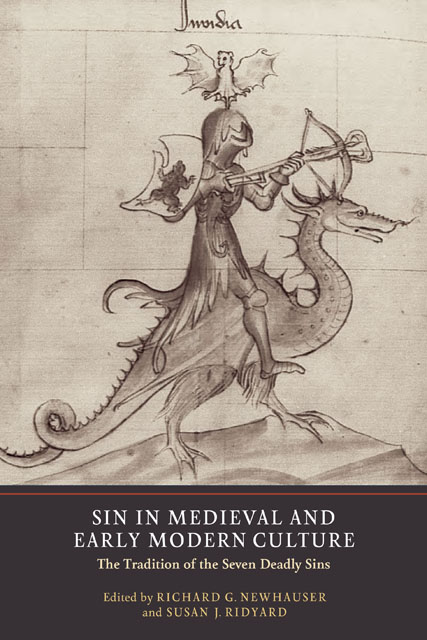12 - Singing Sin: Michel Beheim’s ‘Little Book of the Seven Deadly Sins’, a German Pre-Reformation Religious Text for the Laity
Published online by Cambridge University Press: 28 February 2023
Summary
Michel Beheim (d. c. 1474), a wandering performer and poet who composed song-poems for laypersons of the highest social strata in an age of budding literacy and nascent book publishing, wrote a song-cycle in German on the seven deadly sins which he called a ‘Little Book’ (buchlin). His source text was the Erchantnuzz der sund (Knowledge of Sin), a prose manual in the German vernacular from the previous century usually attributed to the theologian and professor at the University of Vienna, Heinrich von Langenstein (d. 1397). Beheim, viewing himself as theologian, pedagogue and spiritual physician to the laity in one person, drastically edits and versifies portions of the Erchantnuzz der sund, setting prose into rhymed passages on the sins that either can be read as a kind of devotional manual or sung in public performance. Beheim interprets pride and lust to be the most pernicious of the deadly sins.
Michel Beheim (d. c. 1474) was a prolific author, musical composer and promoter of lay spirituality in pre-Reformation Germany who is most closely associated with Habsburg Vienna. His audience was composed of the political elite of his day, the highest lay nobles at ducal, royal and imperial courts. Beheim’s work is important both for his chronicles and historical songs, among which is a song-poem on the fifteenth-century Dracula, Vlad the Impaler, and for his self-conscious and ambitious acts of literary conservation. Author of over 450 works (most of which he scrupulously recorded himself in manuscripts), he recapitulates, synthesizes and preserves the major poetic forms regnant in the German Middle Ages. Besides chronicles, Beheim composed political poems, love songs, fables with morals, moral and ethical poetry, autobiographical song, ballads, advice to princes, exempla, lyrics to the Virgin Mary bordering on Mariolatry, and religious song-cycles. One such cycle, which Beheim calls a Little Book on the Seven Deadly Sins (Buchlin von den siben tat sunden) – henceforth the Little Book – is the topic of the present paper. Here, as elsewhere, Beheim sees his role as compiler and adapter of homiletic texts that he re-frames in the vernacular, in simple and direct speech.
Beheim assumes the mantle of a conservator of faith. Conformist and conservative to the extreme, he introduces himself in one song as the fervent opponent of heresy:
Hie wil ich, Michel Pehamer,
mit singen machen offennper,
wie checzer und auch czauberer
manchen menschen petoren.
- Type
- Chapter
- Information
- Sin in Medieval and Early Modern CultureThe Tradition of the Seven Deadly Sins, pp. 282 - 303Publisher: Boydell & BrewerPrint publication year: 2012



